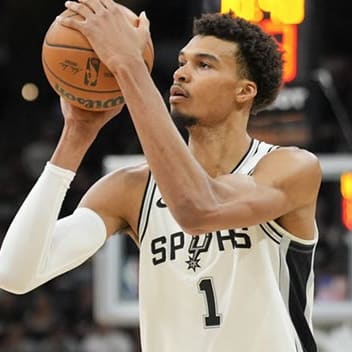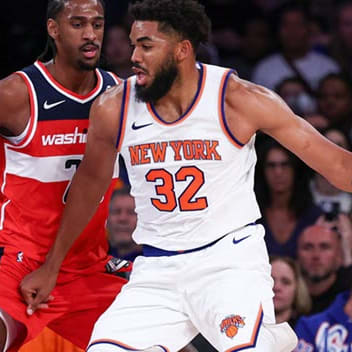This article is part of our NBA Offseason series.
Chris Paul's six-year run in Los Angeles came to an abrupt halt Wednesday morning, as the Clippers traded the nine-time All-Star to Western Conference rival Houston.
The deal marks the end of what was by far the most successful stretch in Clippers history, one that began almost immediately when Paul came to town in the summer of 2011. With Blake Griffin and DeAndre Jordan as running mates, Paul led the Clippers to five 50-win seasons -- plus a 40-26 record during the lockout year -- and a win percentage north of 65%.
While the Clippers' postseason struggles were well-documented, Paul remained the gold standard for point guard play, and his departure leaves Los Angeles in an uncertain position going forward.
After initially stating that he'd decline his player option for the 2017-18 season, Paul instead opted in, enabling him to be traded to Houston while preserving his ability to sign a supermax extension when his contract is up next summer. The decision to opt in was, more or less, a show of good faith toward the Clippers, who otherwise would have watched Paul sign with Houston as a free agent, netting no assets in return.
The deal centers around a few core players and at least four throw-ins for salary purposes. As of Wednesday afternoon, the Rockets will send a massive package to Los Angeles comprised of: Lou Williams, Patrick Beverley, Sam Dekker, Montrezl Harrell, Kyle Wiltjer, Darrun Hilliard, and DeAndre Liggins.
Source: Terms of Clippers-Rockets deal: For @CP3, Houston sends Williams, Beverley, Dekker, Liggins, Hilliard, Harrell, Wiltjer, FRP + $661K
— Adrian Wojnarowski (@WojVerticalNBA) June 28, 2017
Williams, Beverley and Dekker are the obvious centerpieces of the deal, while Harrell and Kyle Wiltjer, a 2016 second-round pick, could end up sticking with the Clippers. Details are still emerging, but the remaining players appear to be included solely for salary maneuvering purposes. The Rockets must meet a certain dollar figure to match Paul's cap figure and complete the deal, per NBA rules.
In addition to Liggins and Hilliard -- whom the Rockets acquired Wednesday from Dallas and Detroit, respectively -- Shawn Long, Ryan Kelly and Tim Quarterman may also be included, per previous reports from Wojnarowski and Chris Vivlamore of the Atlanta Journal-Constitution:
Portland has traded Tim Quarterman to the Houston Rockets for cash, league source tells @TheVertical.
— Adrian Wojnarowski (@WojVerticalNBA) June 28, 2017
Philadelphia has traded Shawn Long to Houston for cash and a 2018 second-round pick, league source tells @TheVertical.
— Adrian Wojnarowski (@WojVerticalNBA) June 28, 2017
The Hawks are nearing a deal to trade Ryan Kelly to the Rockets for cash considerations. Could be completed today.
— Chris Vivlamore (@CVivlamoreAJC) June 28, 2017
All five of Liggins, Hilliard, Long, Kelly and Quarterman are on non-guaranteed contracts next season, making them attractive trade pieces since they can be acquired and subsequently waived before a certain date without monetary penalty.
In addition to the massive haul of players, the Clippers will also receive the Rockets' 2018 first-round pick, which carries top-3 protection, per USA Today's Sam Amick. So barring a catastrophic turn of events, the pick will convey in 2018.
All things considered, a package centered around three borderline-starters and what will probably be a late-first-round pick isn't overly exciting. However, considering the alternative, the Clippers did well to bring in a handful of assets without taking on any regrettable contracts.
With the details of the trade out of the way, let's take a look at what it means for the fantasy value of the two key players involved:
Considering the Rockets now have perhaps the two best distributing point guards in the NBA, this is a massively difficult trade to project. For almost his entire career, when Chris Paul has been on the floor, the ball has been in his hands. That will still be the case much of the time in Houston, but it's hard to imagine the Rockets rushing to shift James Harden off the ball on the heels of one of the best offensive seasons in league history.
Striking a balance between Paul and Harden handling the ball will be the key to unlocking their potential. If both players find ways to be effective off the ball, Houston's offense will rival Golden State as the deadliest in the league.
Scoring-wise, Paul likely won't experience much of a drop-off. Scoring has never been his top priority, but he's cruised to a career average of 18.7 per game on better than 47 percent shooting. Paul came in at 18.1 points per game last season, his lowest average in four years, and that number seems replicable, especially considering he played a career-low 31.5 minutes per game in 2016-17.
At 32 years old with a long list of injuries, Paul's workload will be kept in check, but it could easily climb into the 32-34 minute range. The Rockets lost their second-unit point guard in Beverley -- and Lou Williams' creating ability will be missed -- so one of Harden or Paul will virtually have to be on the floor at all times, unless the Rockets acquire another playmaking star, which Daryl Morey is furiously working to make a possibility.
As with his scoring, Paul's rebounding and steals numbers should remain relatively constant. Even if we're accounting for another year of wear and tear, Paul hasn't given fantasy owners much of a reason to believe he'll slow down in either category any time soon.
Per 36 minutes, Paul's steals numbers last season (2.2) were right in line with his career averages (2.3), and he rebounded at the highest rate (5.7 per-36) of his career. Factoring in the uptick in pace D'Antoni's system entails, as well replacing rebound-vacuum DeAndre Jordan with Clint Capela, and there's little reason to worry about these two categories.
Assists, however, could be a different story. When healthy, Paul has been one of the most reliable sources of assists for the past decade, but he's never played alongside another guard with James Harden's passing ability. When the two are on the court together, sliding Harden off the ball seems like the more natural fit. With more size and plenty of experience at the two, Harden will be the nominal "shooting guard," but both he and Paul will take turns working as the primary initiator. The probable result is both experience a drop in assists, met with an uptick in efficiency for two players who are already among the NBA's most lethal offensive stars.
Harden and Paul ranked second and fourth, respectively, in assist rate last season. That won't be replicable unless their minutes are frequently staggered, which may be necessary after Houston gutted its guard depth in the trade.
Most of same rules mentioned with regard to Paul will also apply to Harden. Adjusting to playing alongside Paul will take time, but this is someone who shared a backcourt with Russell Westbrook, so the concept of conceding playmaking duties isn't exactly foreign.
That said, the Harden of today is a far different player than the OKC version. With Paul in the mix, Harden's scoring will likely dip, factoring an expected drop in the isolation possessions he so often operated out of last season. The good news for fantasy owners is that Harden could sacrifice four or five points and still hover around 25 per game. The Rockets hope the adjustment will mirror that of Kevin Durant, who dropped from 28.2 points per game in 2015-16 to 25.1 last season but made up for it with career-high field goal and true shooting percentages.
Houston's other goal, of course, is to take the immense playmaking pressure off of Harden. No player was asked to do more to keep an offense afloat than Harden, and the toll it took on his body was evident in April and May.
Like Paul, Harden's assist numbers will probably wane by default, but he should be able to cut down on turnovers after registering 5.7 per game in last season, by far a career-worst. Those empty possessions were deemed a byproduct of Harden's heavy usage, and justifiably so. The addition of Paul should enable him to better pick his spots and avoid being caught in compromising positions late in possessions.
Harden's rebounding may be the most difficult category to project into next season. Despite being an elite rebounder for his size, Paul doesn't exactly threaten Harden when it comes to a one-on-one rebounding opportunity. Last season, both Harden and Russell Westbrook demonstrated that simply challenging for more boards as a guard may be the biggest factor, and not much else explains both players' dramatic jump in per-game rebounds.
As for Williams, Beverley and Dekker, all three should find themselves in an equally favorable, if not more favorable, situation next season. However, the Clippers' surrounding roster could look drastically different after free agency. J.J. Redick is all but gone, Blake Griffin is an unrestricted free agent, and DeAndre Jordan's name has reportedly been tossed around in trade talks.
Should the Clippers hold on to all three players obtained in the trade, moving on from Redick and Griffin (and perhaps Jordan, as well) and embracing a full rebuild would likely be the best-case fantasy scenario, particularly for Dekker, who is the most intriguing long-term asset of the three.












